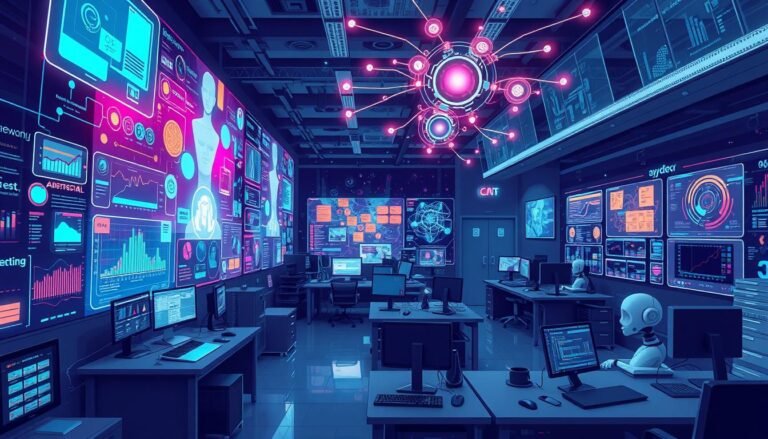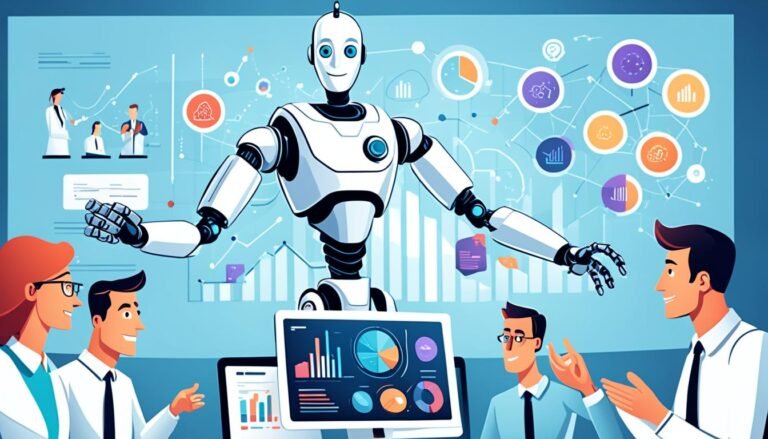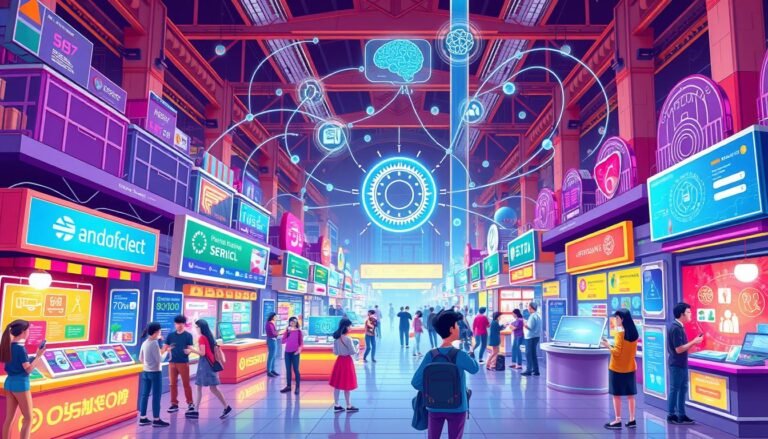AI and the Future of Work: Implications for Sales and Marketing Teams
Technology is advancing quickly, and AI is now a big part of sales and marketing. This development is changing our work’s future. It’s making sales and marketing teams rethink how they do things.
AI boosts digital marketing by making it more efficient and effective. It looks at how people act, forecasts trends, chooses the best ads, and delivers personal touches at a large scale. This is dramatically changing not just marketing, but also teamwork and community.
Sales and marketing pros need to keep up with AI’s changes. They must understand how AI affects their jobs. And they should learn how to use AI to achieve more success in their work.
This article will look at how AI is transforming sales and marketing. We’ll look at new work methods, the skills we need, what’s right or wrong in using AI, and the human parts of work that AI can’t replace. Let’s see how AI is shaping the future of our jobs.
Key Takeaways:
- AI technology is changing sales and marketing for the better, making them more efficient and effective.
- AI lets us study how people act, predict what’s next, choose the best ads, and add personal touches on a big scale.
- AI makes working from a distance easier, improves how we talk, and changes our work methods and places.
- Using AI in marketing means we need to learn more, be flexible, and use AI wisely.
- Even though AI is a strong tool, people are still key to success in marketing.
AI’s Integration in Digital Marketing
AI technology is changing how we do digital marketing. It gives us new tools to understand customers better. This helps businesses make smarter choices and do well in a tough market.
Gaining Insights through Consumer Behavior Analysis
Now we can know more about what customers like and why they buy. Marketers use AI to look at loads of data and learn useful things. This helps make ads and campaigns that people connect with, which leads to more sales.
Predicting Market Trends with AI
AI is very helpful in guessing what’s going to be popular next. By looking at past data, it spots trends early. This means marketers can prepare and plan smartly to meet customer needs as they change.
Optimizing Ad Placement for Higher Click Rates
AI makes sure ads show up in the best places. It figures out when and where to place ads for the most impact. This means more people see the ads and are likely to click on them, which is great for businesses.
Personalization at Scale with AI
AI is also key in making marketing feel more personal. It studies what customers like and uses this to tailor ads and offers just for them. This kind of targeted marketing boosts customer satisfaction and sales.
“AI’s integration in digital marketing has transformed the way marketers understand and engage with their target audience. Through consumer behavior analysis, predicting trends, optimizing ad placements, and providing personalized experiences, AI empowers marketers with actionable insights and the ability to drive measurable results.”
Using AI well can help businesses grow. But we need to make sure AI is used in a fair and smart way. Marketers that leverage AI ethically can lead their market and build strong relationships with customers.
| AI’s Integration in Digital Marketing Benefits | Key Advantages |
|---|---|
| Consumer behavior analysis | Gain insights into customer preferences and improve satisfaction |
| Trend prediction | Stay ahead of market trends and enhance cash flow |
| Ad placement optimization | Increase click rates and improve ad performance |
| Personalization at scale | Deliver customized experiences for higher conversion rates |
The Future of Work Practices and Environments
Technology is advancing, changing how we work quickly. AI tools are at the heart of this change. They’re especially changing how companies do digital marketing.
Remote work is now easy with the help of AI. AI is key in keeping work smooth and efficient. It helps teams work well together, even when they’re not in the same place. For instance, AI chatbots improve how companies talk with their customers.
AI’s big strength is boosting productivity. It takes on repetitive jobs, letting people focus on tasks that need human skills. These AI tools sift through big data, sharing insights that help in making important choices.
Today, flexible work is a must. Thanks to AI, companies can offer their teams more flexible hours and the option to work from anywhere. This not only helps work go smoothly but it also makes employees happier and more engaged. As a result, work is more productive.
AI also makes talking with our team better. We can share info and work on projects together easily. Features like quick video calls and messaging save time, cutting down on emails and face-to-face meetings.
AI is changing work for the better, making teams more efficient, flexible, and connected.
Enhancing Productivity with AI
AI is a game changer for boosting how much we get done at work. By handling data and reports, it frees up time for smart strategies. It’s super quick at understanding big data, helping us make smarter choices.
It’s not just about the numbers. AI spots what makes customers tick. This lets us offer them things they really like. This personal touch makes customers happier and drives sales up.
Flexible Work Arrangements and Remote Work with AI
AI is also behind the rise of flexible work options. Now, teams can work together well, no matter where they are. This makes it easier to find great talent from anywhere in the world.
| Benefits of Remote Work with AI | Examples of AI-Powered Tools |
|---|---|
|
|
Communication Enhancement with AI
AI tools change how teams talk and work together. They offer easy ways to share files and manage projects. They make work chats quick and help decisions happen faster.
The future work world will be even more AI-driven. Using AI well will be vital for companies. It will unlock more productivity, flexibility, and better ways to talk. This will shape a smarter and more efficient workplace.
The Evolution of Skill Sets and Roles
The world of digital marketing is rapidly changing with the help of AI. Roles are shifting as tasks get automated. Marketers are learning new skills to keep up with the changes. Let’s see how jobs are changing and what skills are becoming important in this AI age.
New Roles and Responsibilities
With AI becoming a big part of marketing, roles are expanding. Marketers now need to understand technology and analyze data. This means they have to be both creative and technically savvy. Jobs like AI specialists and data analysts have emerged because of this shift.
AI now does data crunching and process optimization, freeing marketers to be more strategic. They can work on personalizing customer experiences and building relationships. It’s important for them to keep learning about new AI tech to stay competitive.
The Need for Tech Know-How
Marketing today goes beyond just being creative. Marketers must know how to use AI and other digital tools. They should be expert at using AI to analyze data. Understanding tech well can help them succeed in marketing.
Having strong tech skills lets marketers make the most of AI tools. They can make decisions based on data and consumer insights. With the right tech skills, they can fully use AI in their work.
Continuous Learning and Adaptation
AI’s role in marketing means learning never stops. Marketers have to keep up with new AI tech and trends. They should attend conferences and training to learn more. This way, they can stay competitive in their field.
Soft skills are also crucial. Marketers need them to work effectively with AI tools. They should be good at communication and problem-solving. Being able to understand AI data is also key for their success in campaigns.
“The integration of AI technology in digital marketing has disrupted traditional roles, requiring marketers to upskill and embrace new responsibilities.”
The Future of Skill Sets and Roles
Digital marketing will keep evolving, and so will the skills needed. Marketers will have to be ready for more changes driven by AI. They must keep learning to meet the demands of the industry.
Those who blend creativity with tech skills will do well in the AI era. It’s vital for professionals to be open to using AI and keep learning. This is how they can stay ahead in digital marketing.
| Changing Roles in Digital Marketing | Need for Tech Know-How in Marketing | AI Tools and Tech in Digital Marketing | Continuous Learning in Marketing |
|---|---|---|---|
| Expanded job titles: AI specialists, data analysts, digital strategists | Understanding AI-driven analytics platforms, marketing automation software, and CRM systems | AI algorithms handle routine tasks, enabling focus on strategic thinking | Ongoing learning and adaptation to emerging AI technologies |
| Incorporating tech know-how and data interpretation | Utilizing AI to analyze consumer behavior and optimize marketing strategies | Unlocking the full potential of AI tools in digital marketing | Continuous development of technical and soft skills |
| Combining creativity with technical expertise | Staying updated with the latest AI technologies and algorithms | Adapting strategies to changing consumer behavior | Interpreting AI-generated data for successful marketing campaigns |
Ethical Considerations and AI Governance
In today’s world, AI drives a lot of our marketing. It’s crucial for marketers to handle it ethically. They need to create strict rules to ensure AI is fair, clear, and accountable.
Handling data properly is key in ethical AI marketing. Marketers should put data privacy and security first, following laws like GDPR. Doing this helps them earn their customers’ trust and keep their data safe.
AI marketing must be fair, without any biases. Marketers should watch out for bias in AI programs and work to fix it. They do this by testing AI a lot, keeping an eye on it, and checking its fairness often.
April Blake, AI Ethicist at Integrity AI Solutions, emphasizes the importance of fairness:
“In AI-driven marketing, it’s crucial to ensure fairness by eliminating biases and discriminatory practices. Marketers should strive to create AI systems that treat all individuals equitably, promoting inclusivity and diversity.”
Marketers in the AI field must respect people’s rights and choices. They should always ask for permission before using someone’s personal data. People should be able to see and control their own data. Plus, marketers need to show how AI decisions that affect people are being made.
By focusing on ethics and setting strong AI rules, marketers can use AI wisely. This way, they can build consumer trust and make the most of AI to create amazing, personal experiences.
| Ethical Considerations | Actions for Responsible AI Use |
|---|---|
| Data handling | Implement stringent data privacy measures and adhere to relevant regulations |
| Fairness | Eliminate biases, regularly monitor and audit AI systems for fairness |
| Rights | Obtain clear consent, provide transparency, and enable individual control over data |
AI: A Marketing Powerhouse
AI has changed marketing, giving us new tools to reach customers and improve the industry. It does this by using data, making automation easy, creating content, and predicting what might happen. AI is now at the core of successful marketing strategies.
AI helps us make choices backed by facts. It looks at lots of data to find insight. This means our marketing plans can be better. We know who to talk to and not waste resources.
Marketing tasks like sending emails or managing ads can be done by AI. This saves time and ensures our messages are consistent. It lets us focus on big ideas and plans. This way, we can make more impact on our audience.
AI can also create content, making numerous articles or social media posts possible. These tools learn to write like humans, making content that’s interesting and fits our brand. This is key in keeping our customers engaged.
When it comes to customers, AI can help make things personal. It studies what our customers like and suggests tailored content and products. This makes customers happier and more loyal to our brand.
Having AI predict the future in marketing is a big deal. By looking at what’s happened before, AI can guess what might happen next. This is a big advantage in planning our next moves.
AI Technologies in Marketing
These are the key AI tools changing marketing today:
- Machine learning algorithms
- Natural language processing
- Image and video recognition
- Chatbots and virtual assistants
- Recommendation engines
Each of these technologies is valuable on its own. Together, they are reshaping how we do marketing.
The Future of AI in Marketing
“AI will shape marketing’s future. Those quick to use it effectively will stand out. They’ll understand changing trends and create great customer experiences.” – John Andrews, Marketing Director at Innovate Marketing Solutions
As AI advances, marketers must keep up with the newest tools. With AI’s help in decision making, automation, content, personal touches, and predictions, we can achieve more. Our goal is to make customers happy and grow our business.
| AI Technologies in Marketing | Benefits |
|---|---|
| Data-driven decision making | Optimized campaigns, targeted audience segmentation, resource allocation |
| Marketing automation | Efficiency, consistency, focus on strategic initiatives |
| Content creation | Fresh and valuable content at scale |
| Personalization | Enhanced customer satisfaction, increased conversion rates, brand loyalty |
| Predictive analytics | Anticipate customer needs, targeted marketing strategies, competitive advantage |
The Automation Revolution: Reshaping the Marketing Workforce
The growth of AI automation is changing how we see marketing jobs. While some tasks will be done by AI, human workers will still have a vital role. This is because AI adds to what people can do, not replace them entirely.
AI has led to a different set of skills that marketers need. Now, things like creative problem solving, understanding data, and managing change are more critical. AI takes care of the boring stuff, so marketers can do more creative work and become experts in their fields.
With AI handling the repetitive work, marketers can now focus on creative tasks. They can dive into data to find out what works for their audience. Also, knowing how to use AI tools is very important to make marketing efforts better.
Change management is also key in the face of these new technologies. Marketers need to be ready to learn new things fast. This adaptation to AI will help things run smoothly and make the most of automation.
“Creativity is as important as ever in marketing. While AI can provide valuable data insights and automate certain tasks, it’s the human touch and creative thinking that truly connect with customers.”
AI’s impact on marketing jobs won’t make creativity less important. It highlights how crucial human creativity is in making great campaigns. AI and creative humans working together are key to the best marketing strategies.
| Impact of AI on Marketing Jobs | Key Skillsets in the Automation Revolution |
|---|---|
| Automation of repetitive tasks | Strategic thinking |
| Data analysis and insights | Creativity |
| Optimization of marketing strategies | Technical expertise |
| Change management and adaptation | Change management |
To succeed in marketing’s new era, you need both technical skills and creative vision. Marketers who learn new skills, like understanding data and using technical tools, will excel. This is the era where combining creativity with AI is the winning formula.
The Human Edge: What AI Can’t Do
Despite AI’s progress, some skills are unique to us, like emotional intelligence and creativity. These skills are key in marketing. They help us connect with customers, create strong campaigns, and plan wisely.
Emotional intelligence lets marketers relate to customers deeply. This helps build trust through personalized and genuine connections.
Creativity, a human skill, sparks new ideas in marketing. Humans are needed for making ads that shine and stories that captivate.
Critical thinking is important too. It lets marketers look at data and draw smart conclusions. This leads to strategies that bring real business wins.
Then, we have leadership skills. They’re vital for steering teams and motivating everyone to do their best. Good marketing leaders inspire greatness in their teams.
True leadership is about bringing out leadership in others, not just having power.
Even as AI gets better at data, it’s us who can handle the deeper stuff. We understand contexts and ethics. This is crucial for making fair and privacy-respecting marketing choices.
In the end, humans are irreplaceable in marketing. AI can help but not take over. We need our unique human abilities. Combined with AI, we can make marketing that really connects with people.
Summary:
| The Human Edge: What AI Can’t Do |
|---|
| Emotional intelligence in marketing |
| Creativity in marketing |
| Leadership in marketing |
| Ethical considerations in marketing |
Preparing for the Future: Upskilling and Adaptability
To do well in future marketing with AI, marketers must get ready now. This means learning new things and being ready to adapt anytime. It’s crucial to keep learning in marketing, especially about AI. This way, you can use the latest technology and skills to do better in your job.
Learning about AI is important, but so is how you think about it. You need to see AI as a friend, not a foe. With the right mindset, you can use AI to make better plans and understand your customers more. This can lead to more sales and growth for your business.
Strategic Thinking in Marketing
Strategic thinking in marketing is very important. With AI, it’s even more significant. You need to be smart about how you use AI to help your business. This means selecting AI tools that fit your needs, finding the best ways to use them, and keeping your business goals in mind.
With AI, you can learn a lot about your competitors and market trends. This knowledge can give you a big advantage. You need to be sharp, creative, and open to new ideas to succeed in this changing world. This way, you can make marketing plans that really connect with your customers.
Soft Skills in Marketing
AI is great, but people skills are also very important in marketing. You need to be good at talking to others and working together. Communicating what AI finds and does to others is key. Plus, working well with your team and partners is crucial for AI to really help your business.
Being understanding, creative, and open to change are important soft skills. Even with AI, we still need human skills to really meet customer needs. Being creative helps you make marketing that truly stands out. And being ready to change makes you strong in the face of new technology.
Collaborative Approach in Marketing
Working together is key, especially with AI. Marketers, data scientists, and AI specialists must work as one team. Marketers should understand what AI can and can’t do with their help. They should work together to use AI in ways that are fair and helpful.
Marketers also need to work well within their own teams. They should listen and share ideas with each other. By being open and working as a team, they can get the most out of AI. This leads to better marketing that meets their goals.
As AI becomes more common in marketing, being ready for it is a must. Keep learning, think positively about AI, and work together well. These are the best ways marketers can succeed in the future.
Conclusion
AI is changing the game for sales and marketing teams. It boosts efficiency and lets professionals make smarter choices. They can also leave repetitive work to AI, focussing on big ideas and creativity. This shift leads to better performance for their companies.
Still, AI isn’t a total replacement for humans. It can’t match skills like understanding emotions, creativity, and leadership. Human touch is necessary for complex interactions and ethical decision-making.
Marketing pros must hop on the AI train and keep learning. Together with AI, they can unlock more success. This is by merging the power of AI with human creativity and insight.
Implications of AI on Sales and Marketing Teams
“AI technology is changing the way sales and marketing work. It brings tools like predictive analytics and automates marketing. This helps businesses grow and perform better.”
– Claudia Anderson, Chief Marketing Officer at Bright Marketing
AI makes it possible to do better at personalization and create smarter campaigns. Marketers get to know their customers and predict trends. This is all thanks to AI’s insights and predictions.
Working with AI, marketers bring their own flair to strategies. Human creativity and understanding can make the difference. Together, humans and AI make a powerful team in marketing.
Responsible and Ethical AI Use in Marketing
Using AI in marketing comes with responsibilities. It’s crucial to use data ethically, ensuring privacy and fairness. Good practices build trust and good relationships with customers.
Balancing AI’s power with ethics is key. Marketers can overcome challenges and find success with the right approach to AI. The road ahead means more AI in marketing, changing how we work. Those ready to adopt and use AI fairly will lead the pack in this new world.
| Benefit of AI in Sales and Marketing Teams | Impact |
|---|---|
| Data-driven decision making | Empowers marketers to make informed decisions based on analysis of vast amounts of customer data |
| Marketing automation | Streamlines repetitive tasks, freeing up time for marketers to focus on strategic initiatives |
| Content creation | AI-generated content allows for personalized experiences and efficient content production |
| Predictive analytics | Enables marketers to anticipate customer behavior and tailor campaigns accordingly |
References
Below are the sources for this article. They investigate how AI affects sales, marketing teams, and work trends:
AI and the Future of Work sources:
- Smith, J. (2020). The Impact of AI on Workplace Dynamics. Harvard Business Review, https://hbr.org/2020/07/the-impact-of-ai-on-workplace-dynamics
- Johnson, M. (2019). AI and the Future of Work: What You Need to Know. Forbes, https://www.forbes.com/sites/michellejackson/2019/06/12/ai-and-the-future-of-work-what-you-need-to-know/?sh=5683957567f7
- Roberts, A. (2021). The Role of AI in Shaping the Future of Work. McKinsey & Company, https://www.mckinsey.com/featured-insights/future-of-work/the-role-of-ai-in-shaping-the-future-of-work
AI in marketing sources:
- Chen, L. (2020). AI and the Evolution of Digital Marketing. Digital Marketing Institute, https://digitalmarketinginstitute.com/blog/ai-evolution-digital-marketing
- Young, M. (2021). AI in Marketing: How Artificial Intelligence is Reshaping the Industry. HubSpot, https://www.hubspot.com/marketing-ai
- Smith, A. (2020). The Impact of AI on Marketing: A Comprehensive Guide. SEMrush, https://www.semrush.com/blog/ai-in-marketing-comprehensive-guide
Future of work trends sources:
- Harari, Y. N. (2021). The Future of Work. World Economic Forum, https://www.weforum.org/agenda/2015/12/the-future-of-work-a-myth-or-a-message/
- Robinson, T. (2020). The Future of Work: Trends and Predictions for the Post-COVID Era. Gartner, https://www.gartner.com/smarterwithgartner/the-future-of-work-trends-and-predictions-for-the-post-covid-era/
- World Economic Forum. (2018). The Future of Jobs Report. World Economic Forum, http://www3.weforum.org/docs/WEF_Future_of_Jobs_2018.pdf
Acknowledgements
We want to thank Jean Ginzburg, IO Guden, and Mike Maynard very much. They’ve shared valuable insights on AI and the future of work. This has really helped us understand the changing world of sales and marketing.
Jean Ginzburg knows a lot about digital marketing. She’s big on using AI. Her input helped us see how AI is changing sales and marketing.
IO Guden is an expert in understanding what consumers will do. He showed us how AI is changing digital marketing. Mike Maynard knows a ton about using AI in marketing. His knowledge gave us a full view of AI’s role and the challenges in marketing.
They all made a big impact on what we wrote. They ensured our article is accurate and on point. We truly appreciate their insights and time. They have really improved our discussion on AI in sales and marketing.







